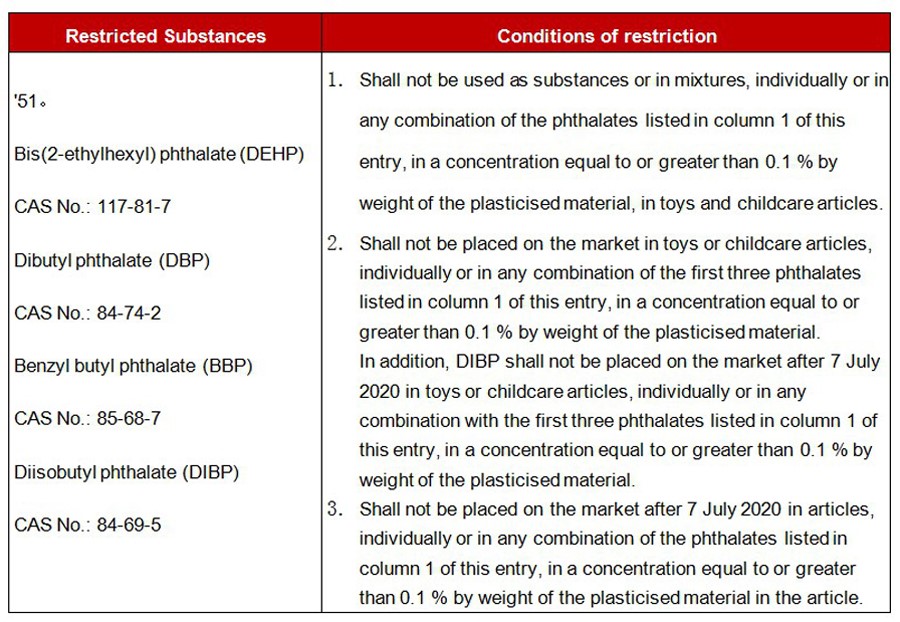
On December 18 ,2018, The European Commission has published Regulation (EU)2018/2005 ,
Amending to the restriction requirements of Entry 51 to REACH annex XVII on specific phthalates. The regulation shall be effective on 7 January 2019.
The important contents of the revision are as follows:
a. Expanding the number of restricted phthalates from three (DEHP, DBP and BBP) to four (DEHP, DBP, BBP and DIBP)
b. Expanding the scope from plasticized materials in toys and childcare articles to plasticized materials in articles.
The restricted phthalates under Entry 51 are summarised as follows:

The phthalate restriction on articles (other than toys and childcare articles) shall not apply to:
1. Articles exclusively for industrial or agricultural use, or for use exclusively in the open air, provided that no plasticised material comes into contact with human mucous membranes or prolonged contact with human skin
2. Aircraft, placed on the market before 7 January 2024, or articles, whenever placed on the market, for use exclusively in the maintenance or repair of those aircraft, where those articles are essential for the safety and airworthiness of the aircraft
3. Motor vehicles within the scope of Directive 2007/46/EC, placed on the market before 7 January 2024, or articles, whenever placed on the market, for use exclusively in the maintenance or repair of those vehicles, where the vehicles cannot function as intended without those articles
4. Articles placed on the market before 7 July 2020
5. Measuring devices and their parts for laboratory use
6. Materials and articles intended to come into contact with food within the scope of Regulation (EC) No 1935/2004 or Commission Regulation (EC) No 10/2011
7. Medical devices and their parts within the scope of Directives 90/385/EEC, 93/42/EEC or 98/79/EC
8. Electrical and electronic equipment within the scope of Directive 2011/65/EU
9. Immediate packaging of medicinal products within the scope of Regulation (EC) No 726/2004, Directive 2001/82/EC or Directive 2001/83/EC
Note:
1. "Plasticised material" means any of the following homogeneous materials:
a. Polyvinyl chloride (PVC), polyvinylidene chloride (PVDC), polyvinyl acetate (PVA), polyurethanes
b. Any other polymer, (including, inter alia, polymer foams and rubber material) except silicone rubber and natural latex coatings
c. Surface coatings, non-slip coatings, finishes, decals, printed designs
d. Adhesives, sealants, paints and inks
2. “Prolonged contact with human skin” means continuous contact of more than 10 minutes duration or intermittent contact over a period of 30 minutes, per day.
3. “Childcare article” means any product intended to facilitate sleep, relaxation, hygiene, the feeding of children or sucking on the part of children.
BACL Service:
BACL, with its headquarter in Silicon Valley, it is a global and comprehensive international third-party testing and certification body. Currently we have physical and chemical testing labs in the United States, Shenzhen, Dongguan, Xiamen and other places, and we have accredited the certifications by UKAS, CNAS, CPSC, CMA and other authorities. We offer a full range of testing services which cover footwear, toys, textile, clothing, leather, jewelry, groceries, food contact materials, cosmetics and electrical and electronic products, etc. We can help enterprises to complete the precise control of whole industry chain from raw materials to the finished products.

 CN/中国
CN/中国  US/USA
US/USA  KR/Korea
KR/Korea  DE/Germany
DE/Germany  ES/Spain
ES/Spain VN/Việtnam
VN/Việtnam